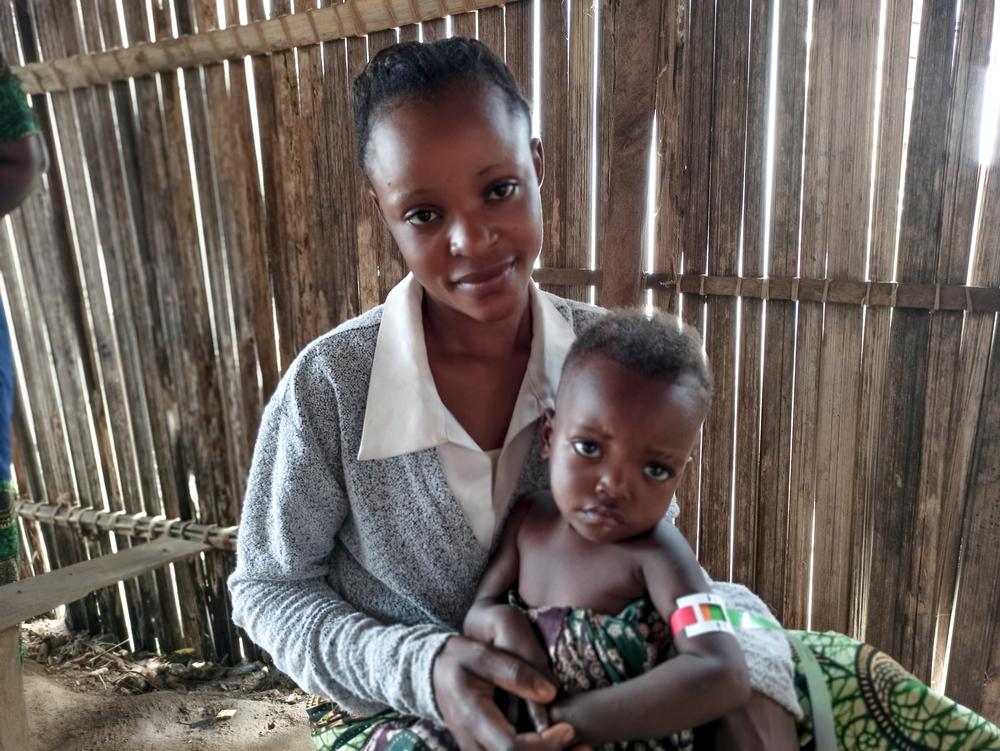The city of Salamabila, in eastern DRC’s Maniema province, is at the centre of a conflict over control of the area’s lucrative mineral resources. Tensions in the region began between artisanal gold miners and a mining company. As the conflict has intensified, the impact on local residents has grown. Local people have been exposed to violence and forced from their homes, with a resulting deterioration in their health, including rising levels of malnutrition among children.
Set up by MSF, the intensive therapeutic feeding center at Salamabila general hospital treats an average of 30 children per week for malnutrition. Among them is Feza, who arrived four days ago.
Four-year-old Feza is being treated for moderate acute malnutrition. “When she arrived, she had a high fever,” says Dr Pierrot Yale, attending physician on the health zone central office account. “In addition to malnutrition, she had malaria, which worsened her condition. We had to give her a blood transfusion and today she is much better."
Fatigue, dizziness and weight loss
Other diseases such as malaria can cause complications and exacerbate malnutrition, making children even more vulnerable. "Many parents are unaware of their child's condition until one or more other illnesses coexist with the malnutrition and weaken the child, sometimes leading to death," says Dr Pierrot.
MSF has launched an initiative to help reduce child deaths from malnutrition by training and equipping 112 people from the local community to help detect malnutrition early. These community ‘prevention and cure’ health workers help parents to monitor the health status of their children using MUAC bands – colour-coded bands which encircle a child’s mid upper arm and given an indication of their nutritional status. If a child’s arm measurement is worrying, the health workers will encourage the parents to take them to a health facility for treatment.
In 2021, MSF teams provided 61,200 consultations for children under five, of whom 2,460 were suffering from malnutrition.
"There are various factors behind the rise in malnutrition,” says MSF nurse Jean-Marie Kamungu at Salamabila general hospital. “On the one hand, gold mining is considered the most important activity for survival, yet it is not easy to obtain. On the other hand, people are afraid to go to the fields for fear of violence. As a result, children are fed only one or two types of food, which is not enough."
From July to December 2021, the team in Salamabila general hospital treated a total of 398 children under six for severe acute malnutrition.
Mental health support aids recovery of children and parents
Children who suffer from severe acute malnutrition often have developmental delays. “Some stop walking or speaking; some even lose the ability to socialise,” says MSF psychologist Nelson Kalume. “They regress in development and this also affects the parents."
To help repair this damage, MSF organises psycho-stimulation sessions for the children and their parents. One of the aims of these sessions is to help re-establish the emotional bond between parents and children. On average, 523 parents and children benefit from MSF’s psycho-stimulation sessions every month.
Since 2019, MSF teams have worked in eight health zones in and around Salamabila to support the Ministry of Health and reduce mortality from diseases that are common in the region.
In Salamabila, MSF provides free-of-charge medical care to children under 15, pregnant women, new mothers, and people affected by crises. MSF teams work in health centres, hospitals and in the community, referring patients for specialist treatment when necessary.
